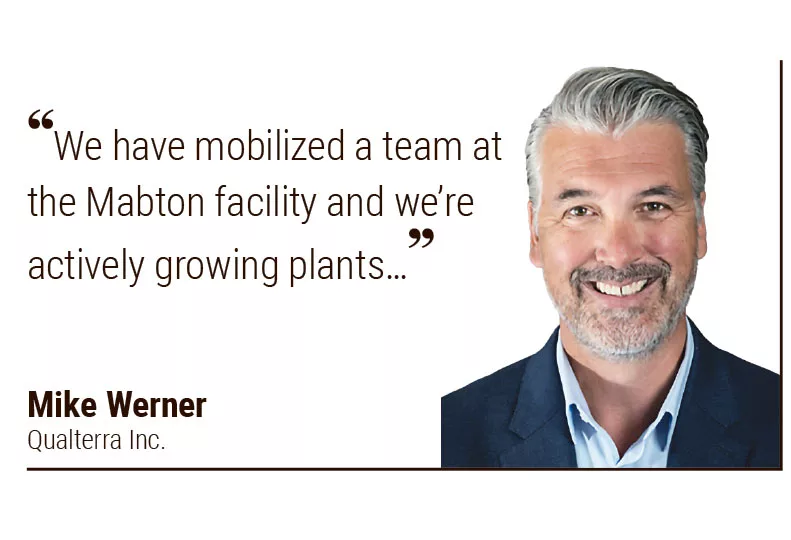
Qualterra takes root in new facility following investment
Efforts to improve soil, plant quality help boost company's production, workforce

Qualterra Inc., an agricultural technology company with a presence in Spokane County, is expanding the company's workforce, production, and scientific research capabilities.
Mike Werner, CEO of Pullman, Washington-based Qualterra, says $4.5 million in funds raised from investors is fueling the company's expansion and growth.
Qualterra's agricultural technologies are focused on plant propagation and plant growth, molecular diagnostics and plant disease testing, biomass processing units, and biochar production. The company grows hops, grapes, roses, apples, and cherries, among other plants.
"We want to help not only grow really healthy plants, but we want to develop healthy cropping systems using all of our products together," he says.
In January, Qualterra announced a significant expansion of its production capabilities with the acquisition of an agricultural campus in Mabton, Washington, that was made possible through investment from Spokane-based Cowles Co.
"We have mobilized a team at the Mabton facility, and we're actively growing plants, working with customers, and adding biochar to much of that plant material," Werner says.
The Mabton agricultural campus is located about 180 miles southwest of the city of Spokane, on an expansive property where Qualterra will operate a 10-acre greenhouse with enough space to accommodate the growth of 15 million plants a year, Werner says.
The property also provides a 63,000-square-foot warehouse for the company's tissue culture micropropagation laboratory, cold storage, and offices. The site also has field growing areas, plant repository buildings, and maintenance and operational facilities that will help scale production.
"Our major investor at the time, the Cowles organization, invested in this greenhouse for Qualterra," Werner says. "We knew it was the right facility where we can take our technologies of growing healthy, true-to-type plants ... in a very large environment."
In addition to the new Mabton facilities, Qualterra also operates a propagation, diagnostic testing, and research laboratory in Pullman, Washington; a biomass processing facility in Cheney; and a small administrative office at Fuel Coworking LLC, located at 809 W. Main, in downtown Spokane.
The company's workforce also is growing, increasing 46%, to 38 employees, up from 26 staff members in 2022. Qualterra is seeking engineers and technicians at its facilities and anticipates hiring about 20 more employees in the next 90 to 120 days, he says.
"If we do things right, it could be more in the future, but that's what we think is going to be required to support the work in front of us right now," says Werner.
Additionally, Qualterra is in the process of having its biochar certified as a high-quality material to capture carbon. Upon certification, which Werner says he expects to happen soon, Qualterra will begin selling carbon credits on the marketplace.
Qualterra's biochar is a type of charcoal created from plant matter, that sequesters carbon and functions as a soil amendment. Biochar is created in the company's biomass processing units, which also capture renewable energy capable of heating indoor spaces, such as warehouses and greenhouses, he says.
Companies interested in purchasing carbon credits are found in a variety of industries, not just agriculture, Werner explains. Some businesses may want to offset their company's carbon emissions, while other organizations may be more concerned about environmental stewardship and climate impacts, both of which are supported through the purchase of carbon credits.
The plan is for growers using biochar to get the established benefits of decreased watering requirements, faster growing times, and healthier plants, as well as an added economic benefit.
"It will essentially cost them less as soon as we're carbon credit certified," he says. "We're going to pass those revenues to our customers as an economic opportunity. That's our goal."
In the last year, Qualterra has conducted a field trial program where 13 different crops were tested using various formulations of the company's ag-based biochar product, different application rates, and the resulting impacts on plants and plant production, with successful results across all of the tested crops, he says.
Going forward, Qualterra will continue raising capital to support plant and biochar production, carbon sequestration, and improving the company's scientific research capabilities.
"Our overarching goal is to grow the healthiest plants we can, to build more biomass processing units, to deliver more biochar to the marketplace, and engage effectively with our customers in ways that create value not only today, but in the future," Werner says.


_web.webp?t=1769673727)
_web.webp?t=1769673728)
_web.webp?t=1769673735)
